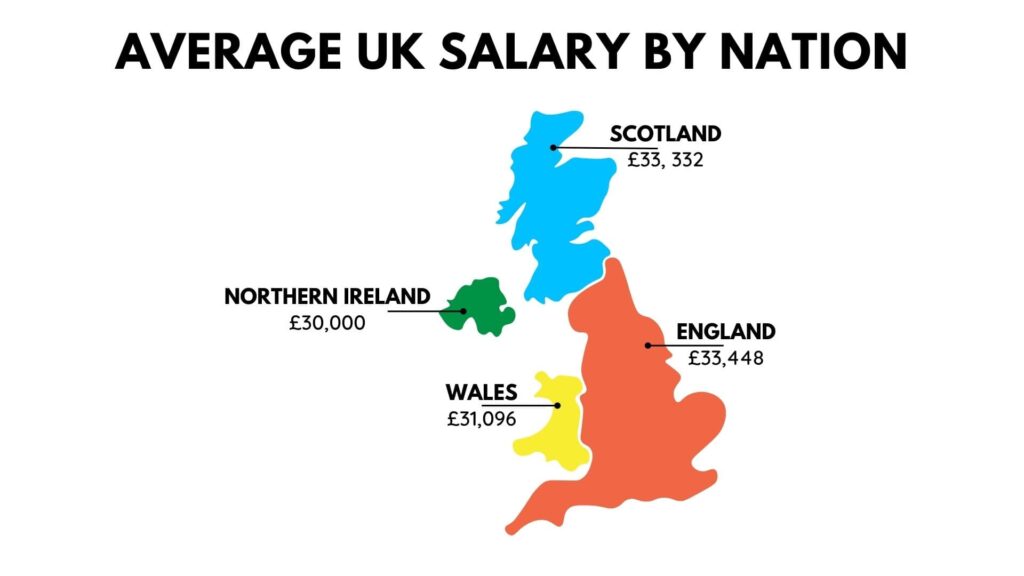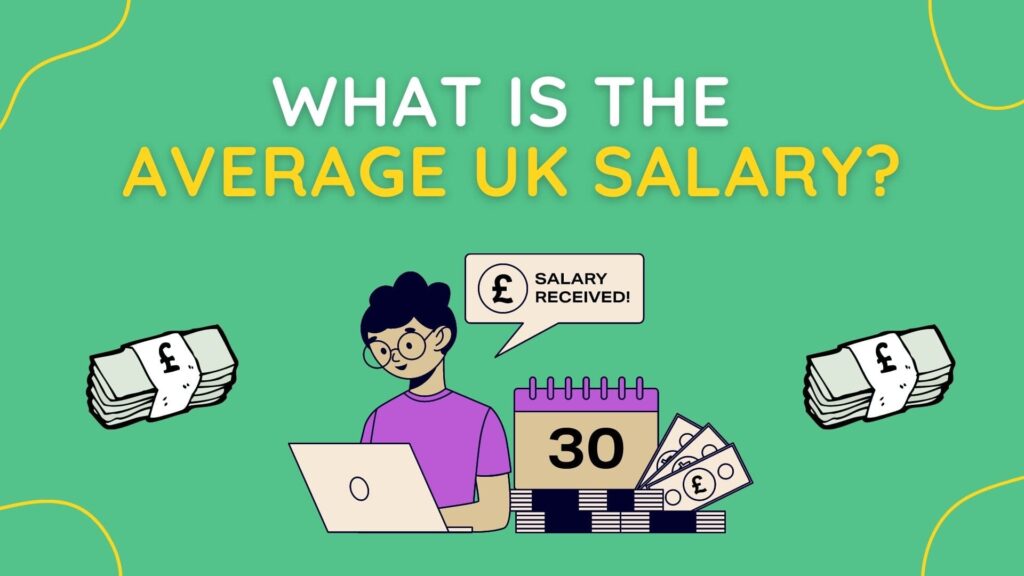
Sammie Ellard-King
I’m Sammie, a money expert and business owner passionate about helping you take control of your wallet. My mission with Up the Gains is to create a safe space to help improve your finances, cut your costs and make you feel good while doing it.

Quickfire Roundup:
The official average UK salary is currently £33,282 a year or £640 a week.
However, the ONS recently released data stating a 7.8% increase (without bonuses included) in salaries in 2023 so far.
Based on my calculations this would place the current UK average salary at £35,257.
Some discrepancies appear due to age, gender and location and you need to bear these in mind.
It’s also worth noting that official figures are based on a median average rather than a mean. Although I will cover both below.
The data used in this article is from the Office of National Statistics and other official surveys taken by some of the major job boards.
The official figures are taken as a median average as the mean often is skewed by the top 1-10% of salaries.
We’ll even share some advice so that, when the time is right, you’ll have the confidence to ask for your own pay rise.
Table of Contents
How to calculate the average UK salary? Mean vs Median.

When you’re looking to compare your salary against the UK average, it’s worth bearing in mind that an average is just that: an average.
It needs to be remembered that the figures quoted take into account certain highly skilled jobs where the pay will always be much more than you’ll receive for an average position.
There are also those at the other end of the scale who are being paid a minimum wage which, importantly when it comes to these figures, varies by age.
The average UK salary is published by the Office for National Statistics (ONS). While many people default to using a mean average, the ONS chooses to use the median regarding wages.
The mean would involve all wages being added up and then divided by the amount that there are. Median, on the other hand, is simply the figure that appears in the middle.
Generally speaking, using a median average will lead to a lower number than using a mean.
The ONS believes that the former provides the most reliable measure as the impact of significant variations is limited.
Podcast Episode 🎙️
Join us for an episode with Elizabeth Willetts founder of Investing In Women, a popular job board promoting flexible working.
We discuss how to close the pay gap, what job sharing is and how to navigate the flexible job world!
Hit the play button just below or get the full episode plus links to Apple or Spotify by clicking Elizabeth’s name just above.
What is the average salary UK?
While figures for the average UK salary exist, it needs to be remembered that interpreting them is a little tricky right now.
That’s thanks to the impact of the pandemic (more on that later) and how it affected wages.
The problem that it’s caused is that comparisons between previous years are not necessarily as meaningful as they were.
That being said, we can see from the latest ONS figures that the average UK salary sits at £640 per week. That comes in at around £33,280 per year.
This comes in slightly higher in London with the average London salaries knocking up around the £37,000 mark.
Although with the reported 7.8% increase factored in London average salary would sit at £39,886.
Now, before you get too carried away with either of those reactions, it’s worth remembering that many factors can impact that average.
Let’s take a look at what those are:
Age
It shouldn’t perhaps come as a huge surprise to learn that experience pays. That probably explains why youngsters seem to earn considerably less than their older counterparts.
Here’s how it breaks down:
- 16-17-year-olds – average £229 per week
- 18 – 21-year-olds – average £402 per week
- 40 – 49-year-olds – average £727 per week
- 50 – 59-year-olds – average £681 per week
- Those aged 60+ – average £603
As the figures above show, it seems to be that salaries peak when we’re in our 40s. It tails off after the age of 60 but that can be explained by those who retire, or at least drop hours in preparation for retirement.
What this shows is that when looking at what is a good salary in the UK, age certainly plays a factor.
Gender

There’s no getting away from the fact that the UK still faces issues with a gender pay gap. Of course, we know more about the situation now as there are laws that require businesses over a certain size to report on it.
Just as an example, it’s worth revisiting the figures that we’ve just looked at:
- The average for 16-17-year-olds is made up of £241 for males and £20 for females
- The average for 18-21-year-olds is made up of £411 for males and £393 for females
The figures from the ONS tell us a little more about this:
- The median hourly pay for full-time employees is 8.3% less for females
- The median hourly pay for part-time workers is 2.8% higher for females
- When looking at the median as a whole, females earn 14.9% less than males
That last figure can be a little misleading when looking at the average UK salary.
That’s because you have to consider that more females are working part-time jobs, and those who work part-time will generally receive a lower hourly rate.
Occupation
If you’re looking at where you stand with the average UK salary, you may have a friend of the same age and gender who earns wildly more or less, than you. That’s because different industries will pay different amounts.
The top-paying roles are:
- Chief Executives and senior officials – median average of £1,561 per week
- Marketing, sales and advertising directors – median average of £1,486 per week
- Aircraft pilots and air traffic controllers – median average of £1,418 per week
- IT directors – £1,408
Average salary UK by Nation

Whereabouts in the UK you are will also have an impact on the average salary. Here’s what the breakdown looks like:
- England – £33,448
- Scotland – £33, 332
- Wales – £31,096
- Northern Ireland – £30,000
What is a good salary in the UK?
When looking at a good salary in the UK, it’s fair to say that the cost of living crisis, and high inflation are having an impact.
When you look at ONS figures, the suggestion is that high earners are those who have a salary of £45,000 or more.
It is also around this figure to live comfortably in the UK with most day to day luxuries and at least one holiday per year. Those who earn £21,160 or less are classed as having a low income.
Those who earn higher salaries tend to work in areas such as finance and insurance.
They’re also more likely to live in the south of the country. The lower earners are most likely to be in East Yorkshire and the Humber, working in customer assistant roles.
How did the pandemic impact UK salaries?

Initially, the Covid-19 pandemic Saw the UK average salary plunge. That was on the back of the initial lockdown and the introduction of the furlough scheme.
As time went on, the average salary began to climb. One explanation for this is that Covid led to a great number of job losses in the hospitality sector.
With these being one of the lowest paying sectors, the effect was that the average UK salary showed an increase with these jobs gone.
That is why figures, right now, should be taken with caution. The next 12 months are likely to give a truer reflection.
Do I deserve a pay rise?
Now you have more of an idea of the average UK salary, and the factors that impact this, you should know where you stand. If, when you consider these factors, you believe that you’re being underpaid, you may be within your rights to seek a rise.
Just bear in mind, few companies will offer a pay rise more than once a year and the best time to ask for one is during an annual appraisal.
How to negotiate a new salary?

If you’ve decided that you’re deserving of a pay rise, you need to know how to approach this. These are the steps that you’ll need to follow:
- Understand your worth – look at your performance and tangible results that you bring to your company
- Research – take a look at the average salary UK and where it sits in your sector
- Consider your reasons – why are you worth more than you’re getting paid right now?
- Practice your pitch – put it all together then create, and perfect, your pitch
- Give and take – you may not get exactly what you want but make sure that you’re flexible
- Don’t be scared to walk away – if your employer refuses to budge don’t feel trapped: there will be other opportunities elsewhere
- Be polite – regardless of the result, don’t burn bridges. Be polite and professional throughout
FAQs
What is a decent living wage UK?
As things stand right now, the living wage in the UK is £10.90 per hour. In London, this increases to £11.95.
Research indicates that for a single person to achieve a comfortable lifestyle, they need to be earning around £25,000 per year as a minimum. For a couple, this increases to over £43,000.
What salary is middle class UK?
Those who fall into the category ‘middle class’ earn the median average wage. In the UK this means that a salary of around the £33,000 mark would mean that you’re middle class.
What salary is upper class UK?
The definition of what makes someone upper class differs depending on where you look. For some, this is about people with hereditary titles and land owners.
However, another approach is that those who are in the 10% of earners are upper class. This means that a salary of around £60,000 would see you qualify.
What is a realistic salary UK?
There is no single answer to what a realistic salary in the UK is. The reality is that this depends on your age, location, qualifications and the sector that you enter.
Sadly, due to the gender pay gap, your sex may also be an influencing factor.
What is the top 10% average salary UK?
Those who earn £62,585 per year are in the top 10% in the UK. Those who are earning £19,000 or less are at the other end of the scale, in the bottom 10%.
Conclusion
Now we know what the average UK salary is you can feel confident about whether or not you sit above or below the average.
As you can see it totally depends on your age, gender, occupation and location.
Share on social media
Disclaimer: Content on this page is for informational purposes and does not constitute financial advice. Always do your own research before making a financially related decision.


